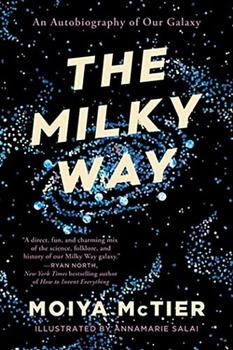Summary | Excerpt | Reviews | Beyond the Book | Readalikes | Genres & Themes | Author Bio

An Autobiography of Our Galaxy
by Moiya McTier
Some of your human physicists predicted what they considered to be an absurd consequence of your second law of thermodynamics, which says that the entropy of a closed system always increases. In other words, the universe as a whole should always be trending towards chaos. But how can that be true if our universe appears to be so organized? One possible explanation, which your physicists have since learned is wrong (this will become a trend), is that our universe as we see it is simply a very fortunate but extremely random distribution of matter. The extreme consequence of that explanation was that as entropy increased and more random fluctuations appeared, some of that matter should take the form of human brains, or at least a similar network of thought cells. Your physicists thought the idea was ridiculous, but you'll soon see that there are plenty of seemingly random fluctuations in the universe. And if matter can combine to form brain-like systems on your little planet, why shouldn't it do the same everywhere else?
Separately, your philosophers have postulated that consciousness isn't a quality inherent to humans, or even living animals. According to them, consciousness, or sentience or awareness or whatever you want to call it, is the result of how a system functions, not a consequence of what it's made of. Some of your philosophers are even starting to believe that consciousness is an inherent quality of the universe, something that every amount of matter possesses in different quantities. In other words, I can think and communicate even though I don't have what you would consider a brain. So if you're imagining I'm anything like one of you, cease immediately! It's insulting, and that human-centric mindset will just make it harder for you to understand all that I am going to deign to teach you.
If your question was more like, "How can the Milky Way talk to me," well, it's not like human language is that hard to learn. You're such simple creatures.
Now that the obvious questions are out of the way, you're probably wondering why I—the greatest galaxy ever, who never even wanted humans to exist in the first place—have chosen to communicate with you.
Whether I like it or not, our lives are intertwined. My existence is, of course, much more important to you than yours is to me, but over time your kind has demonstrated that you aren't completely useless. (You'll have to forgive me if I don't always phrase things in the most pleasant way; the concept of niceties in the manner that you deploy them is fairly new to me. Also, you'll be dead soon, so why should I care if I hurt your precious feelings?)
You see, as far as I can tell, I'm more than thirteen billion of your Earth years old. The story of my glorious birth will come later, but all you need to know right now is that I'm nearly as old as time itself. To use a comparison your kind seems to be fond of—even though it's not even close to an adequate description of my age—I am literally older than dirt. I was alive when the individual atoms that make up your dirt were created billions of light-years away from where they are now. For most of that time, I've been so bored and—though it may not look like it to you—lonely.
If you've heard anything about me at all, you probably think that my life must be so glamorous and full of important, gratifying tasks. Creating all those stars, building all those planets, molding the very essence of the universe according to my will like clay…yeah, it was the ultimate thrill. For a few billion years.
There are only so many new perfect combinations of stars, planets, and moons that a galaxy can forge, so I started making imperfect ones. I experimented until I made something that was kind of a star and kind of a planet, but ultimately failed at being both. I flung black holes at each other until I became numb to the ripples they produced. I built planets on orbits that I knew would result in their either spiraling into their stars or getting flung out of their systems. Hot Jupiters that orbit mysteriously close to their stars? Yeah, that was just a casual experiment, and now they're everywhere. You're welcome, astronomers.
Excerpted from The Milky Way by Moiya McTier. Copyright © 2022 by Moiya McTier. Excerpted by permission of Grand Central Publishing. All rights reserved. No part of this excerpt may be reproduced or reprinted without permission in writing from the publisher.
Your guide toexceptional books
BookBrowse seeks out and recommends the best in contemporary fiction and nonfiction—books that not only engage and entertain but also deepen our understanding of ourselves and the world around us.